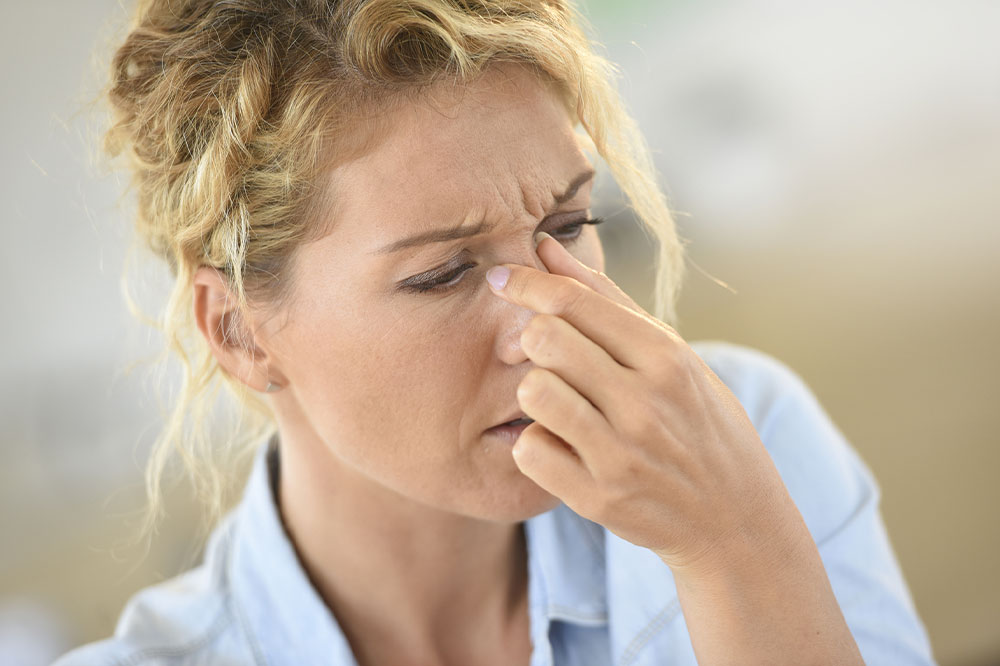Symptoms, Causes, and Treatments for Sinusitis
Thus, sinus infection or “sinusitis” is the swelling or inflammation of the tissue lining the sinuses. Sinuses possess four paired spaces or cavities in the head, which are interconnected by slender channels. The sinus produces thin mucus that is released from the nose channels. The drainage is good for health as it cleans the nose and protects it from bacteria. Although sinuses are filled with air, they may get blocked and filled with fluid. This stimulates the growth of bacteria, leading to sinus infection.
What are the symptoms of sinus infection?
When you experience the following signs, it indicates you may have a sinus infection, necessitating treatment:

Stuffy nose
Runny nose
Headcase
Facial pressure or pain
Mucus in nose
Cough
Sore throat
Bad breath
What are the common causes of sinusitis?
People are often confused about whether a sinus infection is the same as sinusitis. Essentially, the definition of both the terms means the same thing. “Itis” is the swelling or inflammation due to infection, whereas “sinus” is the location of the inflammation or swelling.
Sinusitis is usually caused by a bacteria, virus, or fungus that causes inflammation in the sinuses, thereby blocking it. The potential causes are mainly:
Seasonal and nasal allergies
Polyp growth
Common cold
Deviated septum
Weak immune system
For young children and infants, using a drinking bottle while lying down or extensively utilizing pacifiers can enhance the chances of sinusitis.
What are the different types of sinusitis?
There are four types of sinusitis, which are:
Acute bacterial sinusitis
It highlights the sudden onset of cold symptoms such as stuffy nose, runny nose, or facial pain. These symptoms last for more than ten days. The symptoms may improve but then return, at which point they tend to become worse. This is termed “double sickening”. Doctors usually recommend decongestants and antibiotics for sinus relief.
Chronic sinusitis
The term outlines a condition marked by nasal drainage, congestion, reduced sense of smell and facial pressure. These symptoms last for more than 12 weeks.
Subacute sinusitis
In this case, the symptoms usually last for more than 4-12 weeks.
Recurrent acute sinusitis
When the symptoms reappear four or more times in a year and last less than two weeks every time, it is referred to as recurrent acute sinusitis.
Who can get sinusitis?
Sinus infections can happen to any individual. People with nasal polyps, nasal allergies, abnormal nose structures, and asthma are prone to this condition.
Dry sinusitis treatment
You can easily treat dry sinusitis at home to eliminate discomfort triggered by irritation from chemicals, seasonal allergies, or dry air. Check out the following steps to gain some relief:
Drink adequate water to keep yourself hydrated
Place a humidifier in your room at night to prevent the air from becoming extremely dry
Stop taking antihistamines (always ask your doctor first before stopping it)
Get some fresh air in the house if the air is stagnant or stale
Get sterile saline to irrigate your sinuses via a neti pot
Eradicate the irritants and allergens from your home environment as soon as possible
Utilize nasal sprays to lubricate and hydrate your sinuses and nasal passages
Inhale steam while taking a hot shower
Diffuse essential oils such as peppermint, lemon, or lavender for allergies
Treatment of severe chronic sinusitis
The treatment for severe chronic sinus infection includes the options given below:
Nasal corticosteroids
These are nasal sprays to prevent and treat swelling or inflammation of the sinuses. It includes triamcinolone, fluticasone, mometasone, and several others. If the sprays are ineffective, contact doctors who specialize in sinus treatment immediately to avoid further complications. The doctor is likely to recommend a saline solution to rinse off your nose by mixing it with budesonide to relieve inflammation from chronic sinusitis.
Injected or oral corticosteroids
Oral corticosteroids can have severe side effects when used in the long run. Thus, these are only used for severe chronic sinusitis treatment.
Saline nasal irrigation
Another sinus infection treatment, a saline nasal irrigation, along with nasal solutions or sprays, decreases drainage and eliminates allergies and irritants.
Aspirin desensitization treatment
This is given if the patient develops an adverse reaction to aspirin that could be causing sinusitis or nasal polyps.
The doctors for sinus treatment are mainly primary care physicians or general practitioners. They are skilled and equipped to treat sinusitis or nasal congestion. If the patient suffers from severe chronic sinusitis, he or she is referred to an ear, nose, and throat (ENT) specialist for treatment. For children, pediatricians can diagnose sinusitis symptoms and treat them if the condition is not severe.
People can easily overcome a sinus infection if adequate treatment is provided to them. Home remedies, as well as prescription options, are both effective in getting rid of sinusitis. If you get adequate rest and stay hydrated, your body is likely to recover soon.

